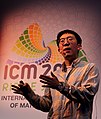Seoul National University
Seoul National University (SNU; Korean: 서울대학교; lit. Seoul University) is a public research university located in Seoul, South Korea. It is one of the SKY universities and a part of the Flagship Korean National Universities.[5]
Not to be confused with the University of Seoul, the Seoul National University of Science and Technology, or the Seoul National University of Education.Motto
The Truth is My Light
August 22, 1946
Ryu Hong-lim[2] (유홍림)
2,278 (2022)[3]
28,264 (2022)[3]
15,870[3]
12,394[3]
4,019[3]
37°27′36″N 126°57′09″E / 37.46000°N 126.95250°E
SNU Blue
Seoul Daehakgyo
Sŏul Taehakkyo
The university's main campus is located in Gwanak, and two additional campuses are located in Daehangno and Pyeongchang. The university comprises sixteen colleges, one graduate school and nine professional schools. The student body consists of nearly 17,000 undergraduate and 11,000 graduate students.[5]
History[edit]
Pre-establishment[edit]
Seoul National University (SNU) originates from various educational institutions established by King Gojong of the Joseon dynasty. Several of them were integrated into various colleges when SNU was founded later.
To modernize the country, Gojong initiated the establishment of modern higher education institutions. By means of the issue of a royal order, the law academy Beopkwan Yangseongso has been founded on March 25, 1895. It produced 209 graduates including the later envoy Yi Tjoune. Hanseong Sabeomhakgyo (established in 1895), a training school for teachers and Euihakkyo (1899), a medical school, are also considered the origins of respective colleges.
After the proclamation of the Korean Empire in 1897, Gojong, the then emperor, was motivated to create more modern education institutions. In 1899, a medical school was established. This school changed its name several times to Daehan Euiwon Gyoyukbu and Gyeongseong Euihak Jeonmunhakgyo (Gyeongseong Medical College) and finally became College of Medicine of SNU. In 1901, a department for nursing was established, which was the forerunner of the later College of Nursing.
During the Japanese rule, Keijō Imperial University was established as one of Japan's nine imperial universities. After World War II and the independence of Korea, the name of the university was changed from Keijō Teikoku Daigaku (京城帝国大学) to Gyeongseong Daehak (경성대학, 京城大學, Gyeongseong University). The Hanja that were used in the name were pronounced in the Korean reading and the attribute "Imperial" was removed. The renaming to "National" was based on the academic nationalism supported by the US military regime in Korea at the time.
Establishment[edit]
SNU was founded on August 27, 1946, by merging ten institutions of higher education around the Seoul area. The schools which have been merged were:
Academics[edit]
Admissions[edit]
Admissions to SNU are extremely competitive. From 1981 to 1987, when an applicant could apply only to one university at a time, more than 80% of the top 0.5% scorers in the annual government-administered scholastic achievement test applied to SNU and many of them were unsuccessful.
Academic structure[edit]
Sixteen colleges of the university offer 83 undergraduate degree programs.[15] For master and doctoral programs there is one graduate school with 99 programs from five fields of studies. The interdisciplinary programs are the ones invented and operated by more than two departments.[16] In addition to that, there are twelve professional graduate schools.[17]
Controversies[edit]
There are issues concerning diversity and racial discrimination against foreign professors at SNU.[55] There was an effort to recruit foreign professors for several years from 2009 onwards, with numbers peaking at 242 or 4% of the total.[56] This number has declined, with a large proportion of the newer "foreign" recruits actually being former South Korean citizens who became naturalized as foreign citizens abroad.[56] Many of the earlier batch of foreign professors left after complaining of racial discrimination against them, sometimes without even giving notice.[55] SNU failed to boost its international reputation by offering contracts to Nobel laureates, but they are mostly retired and holding other academic posts elsewhere, are rarely on campus and sometimes leave before their contracts run out.[55]
Among its notable alumni are prominent figures in international organizations and businesses such as Ban Ki-moon, the eighth secretary-general of the United Nations (UN); Hoesung Lee, chairman of the Intergovernmental Panel on Climate Change (IPCC); Song Sang-hyun, former president of the International Criminal Court (ICC); Lee Jong-wook, the sixth director-general of the World Health Organization (WHO), O-Gon Kwon, former vice president and permanent judge in the International Criminal Tribunal for the former Yugoslavia (ICTY); Kwon Oh-hyun, former CEO and vice chairman of Samsung Electronics; and Bang Si-hyuk, the chairman and founder of HYBE Corporation.




